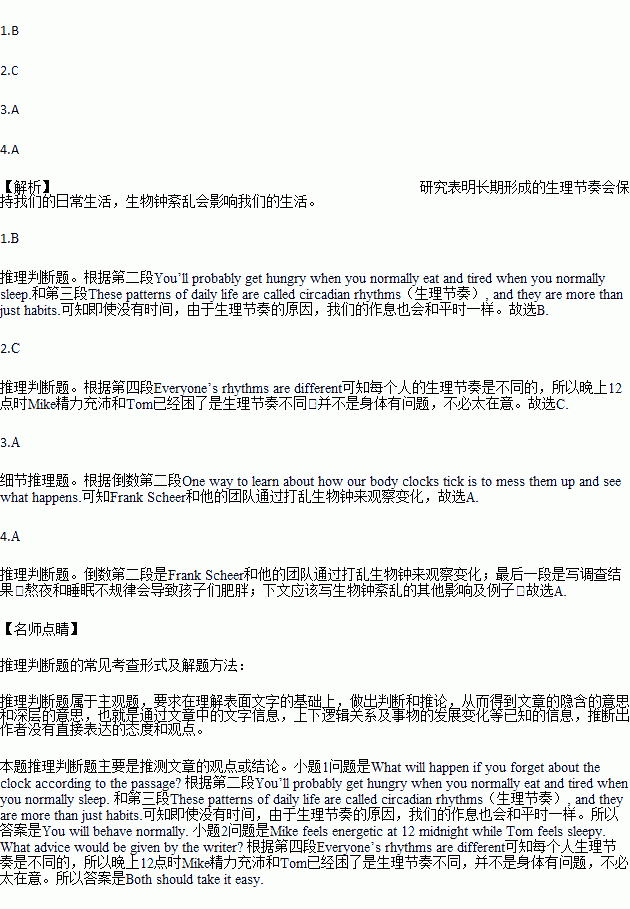题目内容
Try this: For an entire day, forget about the clock. Eat when you’re hungry and sleep when you’re tired. What do you think will happen?
You may be surprised to find that your day is much like most other days. You’ll probably get hungry when you normally eat and tired when you normally sleep. Even though you don’t know what time it is, your body does.
These patterns of daily life are called circadian rhythms(生理节奏), and they are more than just habits. Inside our bodies are several clocklike systems that follow a roughly 24-hour cycle. Throughout the day and night, our inner clocks direct changes in temperature, body chemicals, hunger, sleepiness and more.
Everyone’s rhythms are different, which is why you might like to stay up late while your sister always wants to go to bed early. But on the whole, everyone is programmed to fell tired at night and energetic during the day.
Learning about our body clocks may help scientists understand why problems arise when we act out of step with our circadian rhythms. For example, traveling across time zones can make people wake up in the middle of the night. Regularly staying up late can make kids do worse in tests.
“There is a growing sense that when we eat and when we sleep are important parts of how healthy we are,” says Steven Shea, director of the Sleep Disorders Program at Brigham and Women’s Hospital in Boston.
One way to learn about how our body clocks tick is to mess them up and see what happens. That’s what neurologist(神经病学家)Frank Scheer and his workmates did in a recent study.
Staying up night after night, their studies suggest, could make kids extra hungry and more likely to gain weight. And regularly sleeping too little, Scheer says, may be one cause of the recent increase in childhood obesity.
1.What will happen if you forget about the clock according to the passage?
A. You will feel upset.
B. You will behave normally.
C. Your body will not know what time it is.
D. You will probably get hungry more easily.
2.Mike feels energetic at 12 midnight while Tom feels sleepy. What advice would be given by the writer?
A. Both should see a doctor..
B. Tom should see a doctor.
C. Both should take it easy.
it easy.
D. Mike should have a watch.
3.How do Frank Scheer and his workmates study body clocks?
A. By seeing what happens when they are messed up.
B. By asking questions and collecting answers.
C. By studying people traveling across time zones.
D. By programming people with man-made clocks.
4.What will the writer most probably talk about next?
A. Other examples of what people will do when their body clocks go wrong.
B. Medicines that can keep people from putting on weight.
C. Why it is important to have a normal body clock.
D. What circadian rhythms are.
 开心快乐假期作业暑假作业西安出版社系列答案
开心快乐假期作业暑假作业西安出版社系列答案
